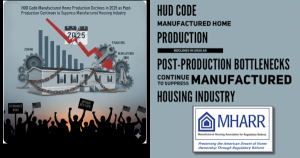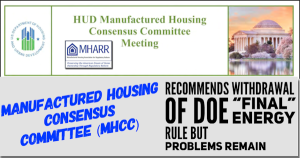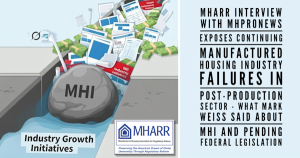MHARR Urges Hud and FHFA To Address Zoning and Consumer Financing Under Their New Agreement

Attached, for your information and follow-up, is a copy of a communication from the Manufactured Housing Association for Regulatory Reform (MHARR) to HUD Secretary Marcia Fudge and Federal Housing Finance Agency (FHFA) Acting Director, Sandra Thompson, regarding the important agreement between the two agencies announced on Friday, August 13, 2021 (see copy attached).
The Memorandum of Understanding (MOU) between these two agencies provides yet another opportunity and basis for concrete action by both, to address and resolve the two main impediments to the greater utilization of HUD Code manufactured housing — i.e., discriminatory and exclusionary zoning restrictions, as well as the unavailability of fully-competitive consumer financing for purchasers of federally-regulated, affordable manufactured housing. As the letter indicates, federal law provides a strong basis to address these fundamental post-production failures, through the enhanced federal preemption of the Manufactured Housing Improvement Act of 2000 (42 U.S.C. 5403(d)) and the “Duty to Serve” provision of the Housing and Economic Recovery Act of 2008 (12 U.S.C. 4565).
We urge other industry members and organizations to share these concerns — and their importance to the industry and consumers — with the leadership of both federal agencies.

Attached, for your information and follow-up, is a copy of a communication from the Manufactured Housing Association for Regulatory Reform (MHARR) to HUD Secretary Marcia Fudge and Federal Housing Finance Agency (FHFA) Acting Director, Sandra Thompson, regarding the important agreement between the two agencies announced on Friday, August 13, 2021 (see copy attached).
The Memorandum of Understanding (MOU) between these two agencies provides yet another opportunity and basis for concrete action by both, to address and resolve the two main impediments to the greater utilization of HUD Code manufactured housing — i.e., discriminatory and exclusionary zoning restrictions, as well as the unavailability of fully-competitive consumer financing for purchasers of federally-regulated, affordable manufactured housing. As the letter indicates, federal law provides a strong basis to address these fundamental post-production failures, through the enhanced federal preemption of the Manufactured Housing Improvement Act of 2000 (42 U.S.C. 5403(d)) and the “Duty to Serve” provision of the Housing and Economic Recovery Act of 2008 (12 U.S.C. 4565).
We urge other industry members and organizations to share these concerns — and their importance to the industry and consumers — with the leadership of both federal agencies.













